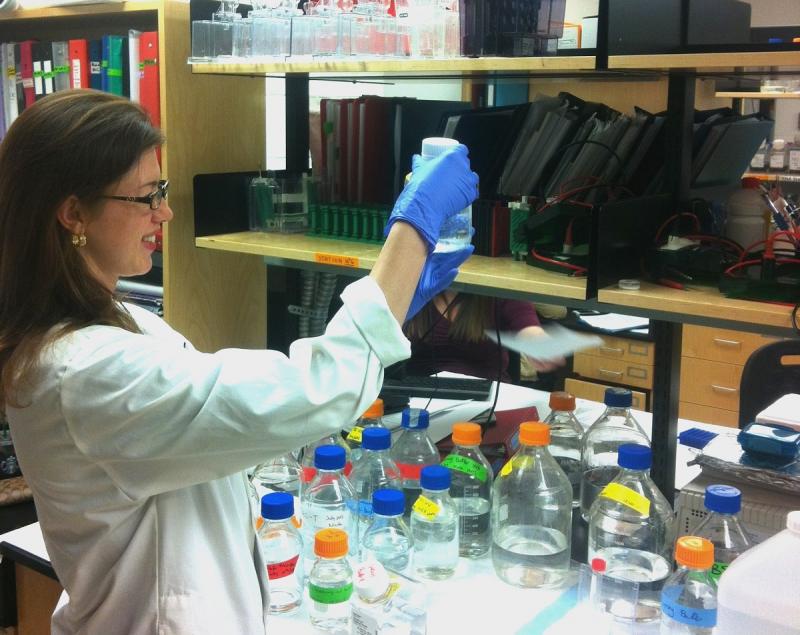July 9, 2018 | Research
Canada’s Top 40 Under 40: U of T professor links cell "generators" to mood disorders
By Carolyn Morris

Groundbreaking research by Ana Andreazza, a professor in the department of pharmacology and toxicology in the Faculty of Medicine, could link mood disorders with cell dysfunction...and point to new treatments.
U of T Professor Ana Andreazza has been named one of Canada’s Top 40 Under 40 for her pioneering work exploring how patients with certain mood disorders have malfunctioning mitochondria. She is also recognized for creating a national research network to bring this poorly understood area of medicine out of the shadows.
Described in biology class as “power plants,” our mitochondria convert the food we eat into the chemical energy we need to live. A malfunction can wreak havoc across our body’s “grid” — disrupting the work of our major organs.
Researchers are increasingly recognizing the role of mitochondrial dysfunction in a variety of conditions — from rare but severe mitochondrial disease, which often proves fatal to children, to heart disease, diabetes, cancer, amyotrophic lateral sclerosis (ALS), bipolar disorder and schizophrenia.
“It’s a common thread in a growing list of diseases, including brain disease, but we still don’t know precisely how mitochondrial relates to each of these,” says Andreazza.
To help change that, she is collaborating with scientists, clinicians, industry experts, the patient advocacy group MitoCanada Foundation and families across Canada to establish a national research network — the Canada Mitochondrial Network (mitoNET) — where she serves as scientific director.
“Through mitoNET, we aim to transform our understanding of mitochondrial dysfunction in disease, and learn how to treat, prevent or even reverse a number of very serious conditions.”
Mitochondria and the Brain
Andreazza’s own research is focused on the brain. Because neurons depend on their mitochondrial power plants, researchers suspect mitochondrial dysfunction could be playing a central role in brain diseases and mood disorders. Andreazza is determined to understand how mitochondrial function might be affecting neurotransmission in conditions such as bipolar disorder.
“If we can connect these dots, we might be able to actually restore neurotransmission by repairing the energy generating system.”
To advance this work, Andreazza is using blood samples and advanced stem-cell technology (induced pluripotent stem cells, or iPSc) to grow neurons and entire brains in the laboratory, in collaboration with Professors Jeff Wrana, Liliana Attisano and Jean Martin Beaulieu. They are investigating how mitochondrial weakness leads to disrupted neurotransmission, and researching potential treatments.
It would be a life-changing development for many patients and families — providing answers for those who have lost children to mitochondrial disease, and struggle to support others with mood disorders or other conditions.
wATCH A VIDEO ON Mitochondria AT MITOnetCANADA
As the Canada’s Top 40 Under 40 honour highlights, Andreazza has reached an advanced level early in her scientific career. She started particularly early.
As a 17-year-old in southern Brazil, Andreazza showed up at the laboratory of a Professor at the local Universidade de Caxias do Sul, holding grape seeds in her hand. Her family had immigrated to Brazil from Italy and produced wine, but was never satisfied with their product in their new country. She wanted to know if her family’s grapes had an antioxidant called resveratrol, which she’d seen the professor quoted about.
“It was completely ridiculous,” Andreazza laughs. “But the professor — Mirian Salvador — was phenomenal. She saw how curious I was and said, ‘why don’t you come work with me.’ I worked there through my undergraduate degree, and learned so much about science — from learning how to pipette, to understanding the role of antioxidants and oxidative stress, it gave me the foundation for my career.”
In the early 2000s, while attending a lecture by Brazilian Psychiatry Professor Flavio Kapczinski, focused on side effects of psychiatric medication, she asked if he thought oxidative stress might be involved. He was intrigued, and became her biochemistry PhD supervisor. Through a series of studies, they discovered that patients with bipolar disorder had high levels of oxidation in their blood DNA, lipids and proteins — and this was related to the disorder itself, not the medication.
At the time, the field of mitochondrial dysfunction research was relatively small — it soon gathered momentum, with more and more studies relating it to a variety of conditions. When given the opportunity to study internationally through a government-funded award, Andreazza reached out to Psychiatry Professor (now Dean of Medicine) Trevor Young, who had made pioneering discoveries related to mitochondrial dysfunction within the brain of people with bipolar disorder.
After collaborating with him on several studies and through a post-doctoral fellowship, Andreazza went on to launch her own laboratory. She is currently a Professor in the Departments of Pharmacology & Toxicology as well as Psychiatry, a collaborator scientist at the Centre for Addiction and Mental Health, and a Canada Research Chair in Molecular Pharmacology of Mood Disorders.
The Next 40 Years: Transforming Mitochondrial Health
While Andreazza never did solve her family’s grape woes, she went on to become a world-leading force in a promising new field of research.
“Ana has made crucial connections between mitochondrial dysfunction in mood disorders, and she’s played a key role in advancing this area of medicine,” says Dean Young. “She is a true collaborative scientist, who shares ideas and findings that help move the whole field forward.”
This is precisely what she is setting out to do with mitoNET.
“We’re now in the era of connecting and collaborating,” she says. “The data is there — what we really need now is to make the connections and develop cross-disciplinary solutions that will put the puzzle pieces together.”
With so many diseases and conditions involved, a completed puzzle could be far-reaching, having an impact on countless lives.
Read about more U of T professors named to Canada's Top 40 Under 40

